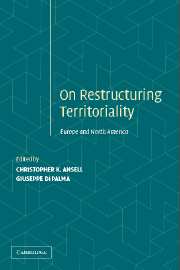Book contents
- Frontmatter
- Contents
- Contributors
- Acknowledgments
- Restructuring Territoriality
- I THEORETICAL FRAMEWORKS
- 1 Restructuring Authority and Territoriality
- 2 Old and New Peripheries in the Processes of European Territorial Integration
- 3 Center–Periphery Alignments and Political Contention in Late-Modern Europe
- II THE TRANSFORMATION OF GOVERNANCE
- III EUROPE–U.S. COMPARISONS
- VI CONCLUDING THOUGHTS
- Reference List
- Index
1 - Restructuring Authority and Territoriality
Published online by Cambridge University Press: 03 December 2009
- Frontmatter
- Contents
- Contributors
- Acknowledgments
- Restructuring Territoriality
- I THEORETICAL FRAMEWORKS
- 1 Restructuring Authority and Territoriality
- 2 Old and New Peripheries in the Processes of European Territorial Integration
- 3 Center–Periphery Alignments and Political Contention in Late-Modern Europe
- II THE TRANSFORMATION OF GOVERNANCE
- III EUROPE–U.S. COMPARISONS
- VI CONCLUDING THOUGHTS
- Reference List
- Index
Summary
This book represents the fruits of a collective inquiry begun in 1997 with the support of the Institute for European Studies and the Institute for Governmental Studies at the University of California, Berkeley, and the European University Institute in Florence. Our inquiry was initially prompted by John Gerard Ruggie's provocative analysis about the “unbundling of territoriality” (Ruggie 1993). Beginning with an analysis of authority relations in medieval Europe, Ruggie argues that the “medieval system of rule was structured by a non-exclusive form of territoriality, in which authority was both personalized and parcelized within and across territorial formations.” In contrast, the distinctive feature of the modern system of rule is that it “differentiated its subject collectivity into territorially defined, fixed, and mutually exclusive enclaves of legitimate domination.” Ruggie argues that, as exemplified by the project of European integration, contemporary trends represent an “unbundling of territoriality.” As the foundational principle of modern politics, territoriality is receding in favor of a nonterritorial, functional organization of political authority. While some have seen this development as a return to the medieval pattern of “overlapping authorities,” Ruggie interprets these developments as a postmodern turn.
In many respects, Ruggie's argument is simply one of the more subtle and provocative examples of an emerging genre arguing that the modern state and the modern state system are being challenged, and perhaps eroded, by a variety of forces ranging from domestic privatization to economic and cultural globalization. The conventional argument runs roughly as follows.
- Type
- Chapter
- Information
- Restructuring TerritorialityEurope and the United States Compared, pp. 3 - 18Publisher: Cambridge University PressPrint publication year: 2004
- 14
- Cited by

